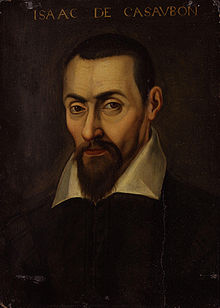Isaac Casaubon

Isaac Casaubon
|
|
| Born | 18 February 1559 Geneva, now Canton of Geneva, Switzerland |
| Died | 1 July 1614 (aged 55) London, United Kingdom |
| Occupation | Classical Scholar, philologist |
| Ethnicity | French, English |
Isaac Casaubon (/kəˈsɔːbən/;French: [kazobɔ̃]; 18 February 1559 – 1 July 1614) was a classical scholar and philologist, first in France and then later in England, regarded by many of his time as the most learned man in Europe.
His son Méric Casaubon was also a classical scholar.
He was born in Geneva to two French Huguenot refugees. The family returned to France after the Edict of Saint-Germain in 1562, and settled at Crest in Dauphiné, where Arnaud Casaubon, Isaac's father, became minister of a Huguenot congregation. Until he was nineteen, Isaac had no education other than that given him by his father. Arnaud was away from home for long periods in the Calvinist camp, and the family regularly fled to the hills to hide from bands of armed Catholics who patrolled the country. It was in a cave in the mountains of Dauphiné, after the massacre of St Bartholomew, that Isaac received his first lesson in Greek, from the textbook Isocrates ad Demonicum.
At the age of nineteen Isaac was sent to the Academy of Geneva, where he read Greek under Franciscus Portus a Cretan. Portus died in 1581, recommending Casaubon, then only twenty-two, as his successor. He remained at Geneva as professor of Greek until 1596. There he married twice, his second wife being Florence Estienne, daughter of the scholar-printer Henri Estienne. At Geneva, Casaubon lacked example, encouragement and assistance and struggled against the troops of the Catholic dukes of Savoy, but became a consummate Greek and classical scholar. He spent all the money he could spare on books, including copying classics that were not then in print. Even though Henri Estienne, Theodore de Beza (rector of the university and professor of theology), and Jacques Lect (Lectius), were men of superior learning, they often had no time for Casaubon.
...
Wikipedia
